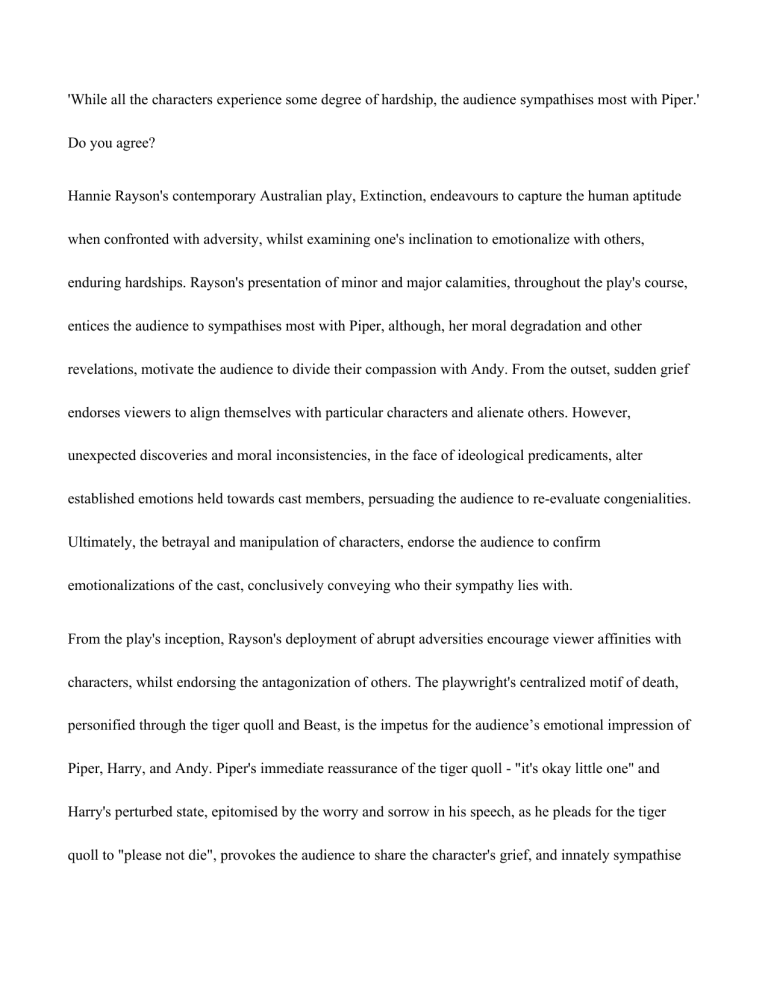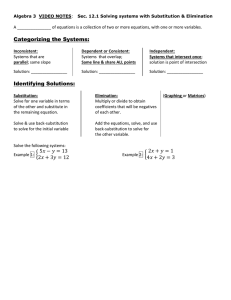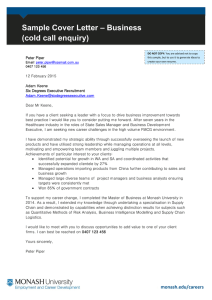
'While all the characters experience some degree of hardship, the audience sympathises most with Piper.' Do you agree? Hannie Rayson's contemporary Australian play, Extinction, endeavours to capture the human aptitude when confronted with adversity, whilst examining one's inclination to emotionalize with others, enduring hardships. Rayson's presentation of minor and major calamities, throughout the play's course, entices the audience to sympathises most with Piper, although, her moral degradation and other revelations, motivate the audience to divide their compassion with Andy. From the outset, sudden grief endorses viewers to align themselves with particular characters and alienate others. However, unexpected discoveries and moral inconsistencies, in the face of ideological predicaments, alter established emotions held towards cast members, persuading the audience to re-evaluate congenialities. Ultimately, the betrayal and manipulation of characters, endorse the audience to confirm emotionalizations of the cast, conclusively conveying who their sympathy lies with. From the play's inception, Rayson's deployment of abrupt adversities encourage viewer affinities with characters, whilst endorsing the antagonization of others. The playwright's centralized motif of death, personified through the tiger quoll and Beast, is the impetus for the audience’s emotional impression of Piper, Harry, and Andy. Piper's immediate reassurance of the tiger quoll - "it's okay little one" and Harry's perturbed state, epitomised by the worry and sorrow in his speech, as he pleads for the tiger quoll to "please not die", provokes the audience to share the character's grief, and innately sympathise with them, as a result of the scenarios apparent difficulty. Moreover, Rayson's abrupt introduction and characterisation of Andy as being callous and remorseless, through his swift actions to "take a large syringe" and "euthanise the quoll", without conferring with Piper, nor Harry, emphasised by Piper's confusion of "what [Andy is] doing", positions viewers to antagonise Andy, due to his lack of morality. This exacerbates the audience’s sympathy towards Piper and Harry, as Piper's outrage that they "needed to at least try [to save the quoll]", motivates the audience to also feel outraged due to their emotional alliance with Piper and Harry. Furthermore, Beast's sudden diagnosis of "cancer" reinforces Piper's grief and so, the playwright positions viewers to feel guilty; thus, empathetic towards her. Rayson's portrayal of Piper's hysteric reaction is strengthened through dramatic convention as "Piper paces" around the animal shelter in disbelief. This coupled with her sheer emotion that Beast's cancer "is so not fair" and Andy's blunt insistence that they are "not going down that path [of treatment]" builds upon the audiences established emotions, as Rayson motivates the audience to feel sorry about Piper loneliness; hence, Andy is viewed as dispassionate in his interactions with others. Harry's compassionate arrival at the animal shelter as he greets Piper apologetically - "sorry about your dog", is much to the contrary of Rayson's depiction of Andy. Harry's further reassurance of Piper that "whatever they can do on humans, they can do on dogs" inspires the audience to respect Harry's warmth and further despise Andy's inhumane dealing of the situation. Therefore, the playwright purposefully manipulates the audience to feel sympathetic and empathetic towards both Piper and Harry, by reason of Andy's moral inconsistencies in expressing his own emotions surrounding death, which Rayson soon unpacks, changing the audience's perspectives. Rayson's utilization of revelations and moral inconsistencies in her characterisation of the cast, prove effective in altering established emotions, persuading the audience to re-evaluate congenialities. Following a drastic chain of events, Piper fickles from her environmental values to more economical and egocentric values aligned with Harry. Piper's continued involvement with Harry, surrounding the "tiger quoll project", acts as the catalyst for the surfacing of Piper's moral flaws. Dixon-Brown and Harry's joint venture to manipulate Piper into "[running] the [tiger quoll] project" is met with firm repudiation by Piper, who commends that there is "no way" that she will be a part of the project, maintaining the audience's perception of Piper's morality authenticity in her environmental values. However, the onset of the second act is both symbolic and transformative in Rayson's characterisation of Piper, as the playwright utilises it to mark a change in Piper's integrity, which ironically discredits her repudiation to being involved in the "tiger quoll project". Piper's decision to "[make] love" with Harry initiates the audience’s re-consideration of the authenticity of Piper's values, due to the irony in her association with Harry, the CEO of Powerhouse Mining. Her blatant desire to deceive Dixon-Brown as she doesn’t "want her knowing about this [their sexual relationship]", complemented with her later stubbornness towards Dixon-Brown that she is “not dropping the tiger quoll project”, accentuates to the audience that Piper possesses selfish ulterior motives, other than the restoration of the bioregion. Therefore, Rayson's enigmatic characterisation of Harry, as both environmentally and economically driven, is emphasised by Pipers labelling of him as a "confusing person", is the ultimate cause for the emergence of her moral blemishes; thus, the audience retract there previously established sympathy and compassion to both characters, especially Harry, who they come to despise for his role in compromising Piper's integrity. However, Piper's admission that her sexual relationship with Harry was "a mistake", does provide viewers an excuse to remain sympathetic and aligned with Piper. The audiences recanted emotions towards Piper and Harry, allow for realisation of Andy's ultimate hardship - "GSS", which shifts their empathy towards him. Rayson's duplicitous concealment of Andy's imminent death, excuses his callous actions in the play's opening. Paradoxically, the audience ironically see the morality in Andy's decisions surrounding conservation, as he has no future like the animals. Andy's confronting prognosis that he has "5 years [to live]", as "there is no treatment", provokes sorrow from the audience as they fathom his lack of control in life, personified through dramatical conventions as "ANDY becomes unsteady…[falling] to the floor", emphasising his vulnerability; hence, softening viewers pre-emptive emotionalization of Andy. This new-found sympathy towards Andy is reinforced through Dixon-Brown's apathetic reminder that she is "the one who’s gonna have to fucking look after [Andy]”, which provokes the audience to feel guilty for their previous attitudes towards Andy and now, feel sympathetic for such characterisation. Therefore, Rayson encourages viewers to reflect on their emotions towards Piper and Andy and so, reconsider the integrity of Piper and their attitude towards Andy. The betrayal and exploitation of characters persuades the audience to reaffirm emotionalizations, undeniably conveying who their sympathy lies with. Harry's womanizing and philandering of Dixon- Brown and Piper, joint with Dixon-Brown's vindictive and ruthless betrayal of Piper, by implying that she was the one named as having a "covert sexual relationship with Harry", and egotistic threats to Andy who he alludes that he is her "onerous responsibility" proves conclusive in viewers perception of the two. Harry's further exploitation of his own company, through his misrepresentation of the "tiger quoll project" as a "public relations exercise", is utilised by Rayson to ultimately punish Harry for all his misdemeanours throughout the play, by the "board… [sacking him]". Likewise, Dixon-Brown's deceitful treatment of Piper and resulting sadistic pleasure of Piper being physically "horrified", by telling her that she will "need to step aside from the [tiger quoll] project", is adequate in the audiences understanding of Dixon-Brown as callous. Therefore, similarly, viewers deprive both Harry and Dixon-Brown of any sympathy or remorse for their eventual demise, when faced with great calamities, and instead, direct their affinities towards Piper and Andy, who's genuine and uncontrollable advertises are understood as being worth the audience’s congeniality. The viewers disregard for the welfare of Harry and DixonBrown strengthen their innate sense of sympathy towards Andy and Dixon-Brown. Andy's announcement to Piper that "I have GSS" sparks an emotional encounter between the two, with Andy's honesty being admired by viewers, by reason of its scarcity in the play. Piper's return to her underlying values of the conservation of life is emphasised by her refusal to Andy's plea that Piper doesn’t "need to prove that [she's] a good person" by "not leaving", infuses the audiences with sympathy and appreciation that Piper and Andy would sacrifice their wellbeing for each other, when encountered with hardships. Furthermore, the appearance of the "tiger quoll" on the "monitor", endorses the audience to optimistically envision a future for the tiger quoll population and Piper and Andy's relationship. Thus, Rayson's characterisation of the cast as being morally flawed, joint with the many adversities in the play, positions viewers to feel sympathetic to Piper and Andy for ultimately upholding their moral convictions and integrity, despite minor blemishes, and view Harry and Dixon-Brown with distain, due to their manipulative contribution to the hardships faced by Piper and Andy. The progression from the play's inception, as positioning viewers to emotionally feel for and disregard characters to the subdued optimistic conclusion that entices audiences to reflect on their emotional understanding of Rayson's characterisation of the cast, leaves the audience with a sense of justice and sympathy towards particular characters. In the end, Extinction celebrates the active role of the viewer in making real the playwright’s intentions in character construction. The audience’s emotions towards characters are effectively conveyed through the power of Rayon's language and symbolism, the use of dramatic staging effects and ultimately characters values and interactions with others.



